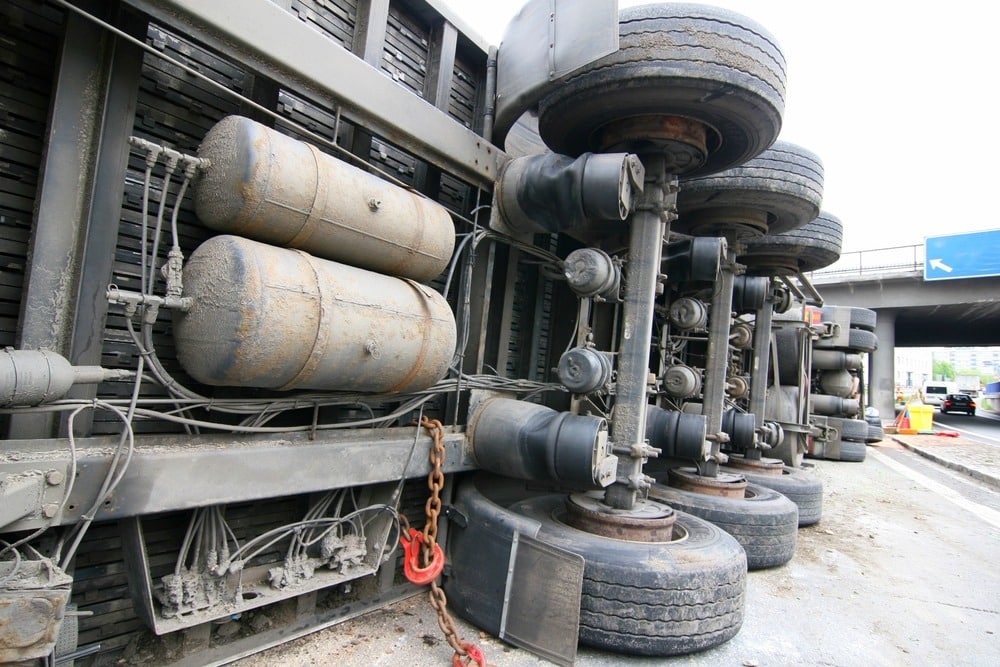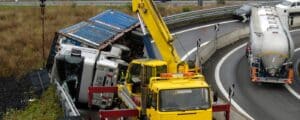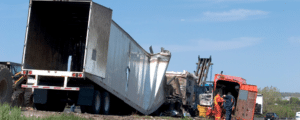- Rules for Loading and Securing Cargo
- Who is responsible for ensuring proper securement of cargo?
- Can anyone else be liable for improperly secured cargo?
- How can overloaded, improperly loaded, and unsecured cargo cause a truck accident?
- What are some other factors that contribute to a cargo-related truck accident?
- How do I prove my accident was a result of improperly secured cargo?
Liability for improper cargo loading oftentimes falls on more than one party, but depends on many things, from the cause of the accident to who handled the cargo. Liable parties may include the individual responsible for the job as well as anyone who may have been responsible for overseeing or supervising the task.
Filing a truck accident claim can be complicated but an attorney from Cordisco & Saile LLC can help you determine whether the cargo was unsafe as well as who could be liable for the improper cargo loading accident.

Rules for Loading and Securing Cargo
According to the FMCSA, drivers must properly secure the following:
- Tailgate
- Doors
- Tarpaulin
- Spare tires
- Cargo securing equipment
The main goal of securement is to prevent the cargo from moving during transit. Unsecured loads can end up spilling out of the truck and onto the road. It can also become increasingly difficult to control a truck properly when cargo shifts, which is why the driver should ensure the cargo has been properly loaded.
FMCSA requires that drivers perform periodic inspections during transit, in addition to the mandatory pre-trip inspection of all cargo (to ensure that it is properly securement and distribution).
There are a few exceptions to these rules. For example, periodic inspections during transit will not be necessary when it is impractical to perform this inspection. These rules may also not apply if loaders sealed the cargo and gave the driver specific instructions not to open it.
In circumstances where drivers can perform periodic inspections, FMCSA requires they make all necessary inspections and adjustments. In some cases, adjustments could necessitate the implementation of additional securing devices.
In addition to ensuring that drivers perform inspections, FMCSA has strict and very detailed requirements for correct securement of cargo. FMCSA goes above and beyond what the average person may consider sufficient in an effort to prevent the grave dangers that improperly loaded and incorrectly secured cargo present to everyone on the roadways.
For example, anyone securing cargo on a large truck must use a specific type of tie-down in a specific location. In addition, if loaders have placed items next to each other and secured them with transverse tie-downs, the objects must have direct contact with each other or the loader must ensure that they will not move towards each other in transit.
Who is responsible for ensuring proper securement of cargo?
The driver is always responsible for ensuring cargo is safe, even if he did not load it. The Federal Motor Carrier Safety Administration (FMCSA) has special requirements in the driver’s handbook regarding securing cargo, including a mandate that a securement system be in place. This is critical for drivers to know and properly execute because the risk of a crash is much greater if the responsible party did not properly secure the cargo.
Can anyone else be liable for improperly secured cargo?
You may also be able to hold the trucking company liable if unsecured cargo leads to an accident. Because trucking companies are responsible for the conduct of their employees, when a driver violates federal regulations and causes an accident, any injured victim can hold the employer accountable.
Meanwhile, in addition to the truck driver, a shipper or property broker may also be responsible for loading the cargo onto the truck. In that case, an unsafe load that causes an accident could lead to injured victims holding these parties responsible as well. Given the many different parties that can contribute to one trucking accident, it is not at all uncommon for a truck accident claim to name more than one party under these circumstances.
How can overloaded, improperly loaded, and unsecured cargo cause a truck accident?
Now that we have discussed possible liable parties, we need to discuss how improperly loaded cargo can cause an accident so we can narrow down the possible liable parties. Overloaded, improperly loaded, and unsecured cargo greatly increases the risk of a cargo-related truck accident. These accidents happen suddenly and are extremely dangerous for everyone on the road.
The main issue with overloading, improperly loading, or under securing cargo is the instability these conditions cause. Instability can lead to a rollover, which can result in a dangerous cargo spill. Cargo spills can make a dangerous accident deadly by creating more road hazards. Instability also makes controlling the truck much more difficult, increasing the likelihood of truck driver error.
What are some other factors that contribute to a cargo-related truck accident?
Have you ever wondered why some highways have signs that specifically state “NO TRUCKS IN LEFT LANE”? This is because speed can play a significant role in trucking accidents. Trucks with especially heavy loads should go slow enough to prevent a rollover accident, especially when turning or driving on an exit ramp.
Truck drivers should also be aware of high crosswinds. An overloaded or improperly loaded truck becomes even more susceptible to tipping in windy conditions.
How do I prove my accident was a result of improperly secured cargo?
To be eligible to file a claim for compensation, you must be able to prove that the accident was a result of improperly secured cargo. To do so, you will need to gather evidence that proves the cause. This evidence may include:
- Cargo loading records
- Logbooks that prove the driver neglected to check the cargo
- Eyewitness statements that the driver was swerving right before the accident occurred
If you were in an accident with a tractor-trailer in Pennsylvania or New Jersey and suspect improper loading or securing of cargo is the potential culprit, give our truck accident attorneys a call. Contact Cordisco & Saile LLC to set up a consultation today: 215-440-6272.






